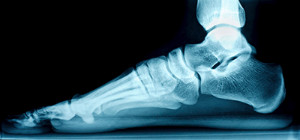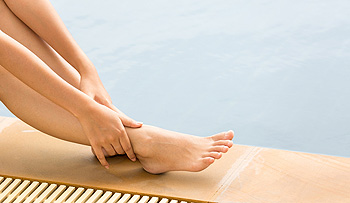Items filtered by date: December 2019
The Function of the Achilles Tendon
 The portion of tissue that connects the calf muscles to the heel is referred to as the Achilles tendon. This tendon makes it possible to walk, in addition to participating in running and jumping activities. If this should become inflamed as a result of an injury or damage that has happened gradually, it may develop into tendonitis. Symptoms of this condition can consist of pain and discomfort surrounding the heel. It can occur if the wrong shoes are worn during exercising, if a new sport is started, or if walking and running take place on an uneven surface. When this tendon is injured, it may be difficult to walk, and the pain may be intense upon arising in the morning. Relief may be found when the affected leg is elevated, and this may help to diminish a portion of the swelling. If you have endured an Achilles tendon injury, it is strongly suggested that you seek the advice of a podiatrist who can help you to manage this condition.
The portion of tissue that connects the calf muscles to the heel is referred to as the Achilles tendon. This tendon makes it possible to walk, in addition to participating in running and jumping activities. If this should become inflamed as a result of an injury or damage that has happened gradually, it may develop into tendonitis. Symptoms of this condition can consist of pain and discomfort surrounding the heel. It can occur if the wrong shoes are worn during exercising, if a new sport is started, or if walking and running take place on an uneven surface. When this tendon is injured, it may be difficult to walk, and the pain may be intense upon arising in the morning. Relief may be found when the affected leg is elevated, and this may help to diminish a portion of the swelling. If you have endured an Achilles tendon injury, it is strongly suggested that you seek the advice of a podiatrist who can help you to manage this condition.
Achilles tendon injuries need immediate attention to avoid future complications. If you have any concerns, contact Dr. Joshua David Scoll of Pennsylvania. Our doctor can provide the care you need to keep you pain-free and on your feet.
What Is the Achilles Tendon?
The Achilles tendon is a tendon that connects the lower leg muscles and calf to the heel of the foot. It is the strongest tendon in the human body and is essential for making movement possible. Because this tendon is such an integral part of the body, any injuries to it can create immense difficulties and should immediately be presented to a doctor.
What Are the Symptoms of an Achilles Tendon Injury?
There are various types of injuries that can affect the Achilles tendon. The two most common injuries are Achilles tendinitis and ruptures of the tendon.
Achilles Tendinitis Symptoms
- Inflammation
- Dull to severe pain
- Increased blood flow to the tendon
- Thickening of the tendon
Rupture Symptoms
- Extreme pain and swelling in the foot
- Total immobility
Treatment and Prevention
Achilles tendon injuries are diagnosed by a thorough physical evaluation, which can include an MRI. Treatment involves rest, physical therapy, and in some cases, surgery. However, various preventative measures can be taken to avoid these injuries, such as:
- Thorough stretching of the tendon before and after exercise
- Strengthening exercises like calf raises, squats, leg curls, leg extensions, leg raises, lunges, and leg presses
If you have any questions please feel free to contact one of our offices located in Philadelphia, Bensalem, and Fairless Hills, PA . We offer the newest diagnostic tools and technology to treat your foot and ankle needs.
Are Bunions Affecting Your Everyday Life?
Are There Differences Between Walking and Running Shoes?
 Research has shown walking shoes have less flexibility than running shoes. People who enjoy running or jogging are aware of the necessity of buying the correct shoes for their chosen sport. There are different styles of running. Long distance runners typically benefit from wearing shoes that have additional cushioning. Additionally, many running shoes have different stabilizing features, which may help to correct overpronation. People who like to walk may opt to wear shoes that are designed for comfort. These types of shoes can include those that are made of a lighter material, and have adequate support to ensure the feet will feel comfortable after a long walk. If you would like additional information about what type of shoe to purchase for running or walking, please speak to a podiatrist.
Research has shown walking shoes have less flexibility than running shoes. People who enjoy running or jogging are aware of the necessity of buying the correct shoes for their chosen sport. There are different styles of running. Long distance runners typically benefit from wearing shoes that have additional cushioning. Additionally, many running shoes have different stabilizing features, which may help to correct overpronation. People who like to walk may opt to wear shoes that are designed for comfort. These types of shoes can include those that are made of a lighter material, and have adequate support to ensure the feet will feel comfortable after a long walk. If you would like additional information about what type of shoe to purchase for running or walking, please speak to a podiatrist.
For more information about walking shoes versus running shoes, consult with Dr. Joshua David Scoll from Pennsylvania. Our doctor can measure your feet to determine what your needs are and help you find an appropriate pair of footwear.
Foot Health: The Differences between Walking & Running Shoes
There are great ways to stay in shape: running and walking are two great exercises to a healthy lifestyle. It is important to know that running shoes and walking shoes are not interchangeable. There is a key difference on how the feet hit the ground when someone is running or walking. This is why one should be aware that a shoe is designed differently for each activity.
You may be asking yourself what the real differences are between walking and running shoes and the answers may shock you.
Differences
Walking doesn’t involve as much stress or impact on the feet as running does. However, this doesn’t mean that you should be any less prepared. When you’re walking, you land on your heels and have your foot roll forward. This rolling motion requires additional support to the feet.
Flexibility – Walking shoes are designed to have soft, flexible soles. This allows the walker to push off easily with each step.
If you have any questions, please feel free to contact one of our offices located in Philadelphia, Bensalem, and Fairless Hills, PA . We offer the newest diagnostic and treatment technologies for all your foot care needs.
Foot Pain Can Occur For Different Reasons
 Each foot consists of twenty-six bones that are linked together by numerous joints, tendons, ligaments, and muscles. The feet endure the weight of the body, and are susceptible to various injuries. Research has indicated that foot pain may occur as a result of improper foot function, in addition to wearing shoes that do not fit correctly. A condition that is known as Morton’s neuroma affects the nerves between two bones. It often happens between the third and fourth toes, and common symptoms can include pain, tenderness, and swelling. Hammertoe causes the middle joint in the second and third toe to protrude and bend downward, often resembling a hammer. Another common injury is an ankle sprain, which can occur when the ankle rolls inward. If you are experiencing any type of foot pain, it is advised that you seek the counsel of a podiatrist as quickly as possible so the correct treatment can begin.
Each foot consists of twenty-six bones that are linked together by numerous joints, tendons, ligaments, and muscles. The feet endure the weight of the body, and are susceptible to various injuries. Research has indicated that foot pain may occur as a result of improper foot function, in addition to wearing shoes that do not fit correctly. A condition that is known as Morton’s neuroma affects the nerves between two bones. It often happens between the third and fourth toes, and common symptoms can include pain, tenderness, and swelling. Hammertoe causes the middle joint in the second and third toe to protrude and bend downward, often resembling a hammer. Another common injury is an ankle sprain, which can occur when the ankle rolls inward. If you are experiencing any type of foot pain, it is advised that you seek the counsel of a podiatrist as quickly as possible so the correct treatment can begin.
Foot Pain
Foot pain can be extremely painful and debilitating. If you have a foot pain, consult with Dr. Joshua David Scoll from Pennsylvania. Our doctor will assess your condition and provide you with quality foot and ankle treatment.
Causes
Foot pain is a very broad condition that could be caused by one or more ailments. The most common include:
- Bunions
- Hammertoes
- Plantar Fasciitis
- Bone Spurs
- Corns
- Tarsal Tunnel Syndrome
- Ingrown Toenails
- Arthritis (such as Gout, Rheumatoid, and Osteoarthritis)
- Flat Feet
- Injury (from stress fractures, broken toe, foot, ankle, Achilles tendon ruptures, and sprains)
- And more
Diagnosis
To figure out the cause of foot pain, podiatrists utilize several different methods. This can range from simple visual inspections and sensation tests to X-rays and MRI scans. Prior medical history, family medical history, and any recent physical traumatic events will all be taken into consideration for a proper diagnosis.
Treatment
Treatment depends upon the cause of the foot pain. Whether it is resting, staying off the foot, or having surgery; podiatrists have a number of treatment options available for foot pain.
If you have any questions, please feel free to contact one of our offices located in Philadelphia, Bensalem, and Fairless Hills, PA . We offer the newest diagnostic and treatment technologies for all your foot care needs.
Can Flat Feet Cause Pain?
 The medical term that is known as flat feet refers to feet that have an absent or low arch. The majority of babies are born without an arch, however it will generally develop as they enter their teenage years. This condition is noticeable when the foot lies completely on the floor. The foot will naturally turn inward in order to grip the floor, which may cause pain and discomfort. The Achilles tendon may become affected as a result of the position of the heel, and this may lead to difficulty with walking. Many patients have found relief when orthotics are worn, which may provide the support that is needed as daily tasks are completed. If you have flat feet, it is suggested that you consult with a podiatrist who can properly evaluate your condition, and recommend the best treatment option for you.
The medical term that is known as flat feet refers to feet that have an absent or low arch. The majority of babies are born without an arch, however it will generally develop as they enter their teenage years. This condition is noticeable when the foot lies completely on the floor. The foot will naturally turn inward in order to grip the floor, which may cause pain and discomfort. The Achilles tendon may become affected as a result of the position of the heel, and this may lead to difficulty with walking. Many patients have found relief when orthotics are worn, which may provide the support that is needed as daily tasks are completed. If you have flat feet, it is suggested that you consult with a podiatrist who can properly evaluate your condition, and recommend the best treatment option for you.
Flatfoot is a condition many people suffer from. If you have flat feet, contact Dr. Joshua David Scoll from Pennsylvania. Our doctor will treat your foot and ankle needs.
What Are Flat Feet?
Flatfoot is a condition in which the arch of the foot is depressed and the sole of the foot is almost completely in contact with the ground. About 20-30% of the population generally has flat feet because their arches never formed during growth.
Conditions & Problems:
Having flat feet makes it difficult to run or walk because of the stress placed on the ankles.
Alignment – The general alignment of your legs can be disrupted, because the ankles move inward which can cause major discomfort.
Knees – If you have complications with your knees, flat feet can be a contributor to arthritis in that area.
Symptoms
- Pain around the heel or arch area
- Trouble standing on the tip toe
- Swelling around the inside of the ankle
- Flat look to one or both feet
- Having your shoes feel uneven when worn
Treatment
If you are experiencing pain and stress on the foot you may weaken the posterior tibial tendon, which runs around the inside of the ankle.
If you have any questions please feel free to contact one of our offices located in Philadelphia, Bensalem, and Fairless Hills, PA . We offer the newest diagnostic and treatment technologies for all your foot and ankle needs.
Who Is Prone To Developing Neuropathy?
 If you are experiencing tingling or burning sensations in your feet, you may have what is referred to as neuropathy. It is known as a disease that affects the nerves in the hands and feet. This nerve damage may extend to the toes, and may occur for various reasons. The inability to determine joint position may also occur, which can result in clumsiness or falls. Diabetes is a condition that is often linked to neuropathy, and it may become worse as the aging process occurs. It may be prevalent in obese patients, in addition to those who have elevated blood pressure. If an injury has occurred to the nerves, reduced blood flow may also lead to neuropathy. Blisters and other foot conditions may develop as a result of the loss of feeling that may happen due to this ailment. If you have any of these symptoms, it is advised that you seek the counsel of a podiatrist.
If you are experiencing tingling or burning sensations in your feet, you may have what is referred to as neuropathy. It is known as a disease that affects the nerves in the hands and feet. This nerve damage may extend to the toes, and may occur for various reasons. The inability to determine joint position may also occur, which can result in clumsiness or falls. Diabetes is a condition that is often linked to neuropathy, and it may become worse as the aging process occurs. It may be prevalent in obese patients, in addition to those who have elevated blood pressure. If an injury has occurred to the nerves, reduced blood flow may also lead to neuropathy. Blisters and other foot conditions may develop as a result of the loss of feeling that may happen due to this ailment. If you have any of these symptoms, it is advised that you seek the counsel of a podiatrist.
Neuropathy
Neuropathy can be a potentially serious condition, especially if it is left undiagnosed. If you have any concerns that you may be experiencing nerve loss in your feet, consult with Dr. Joshua David Scoll from Pennsylvania. Our doctor will assess your condition and provide you with quality foot and ankle treatment for neuropathy.
What Is Neuropathy?
Neuropathy is a condition that leads to damage to the nerves in the body. Peripheral neuropathy, or neuropathy that affects your peripheral nervous system, usually occurs in the feet. Neuropathy can be triggered by a number of different causes. Such causes include diabetes, infections, cancers, disorders, and toxic substances.
Symptoms of Neuropathy Include:
- Numbness
- Sensation loss
- Prickling and tingling sensations
- Throbbing, freezing, burning pains
- Muscle weakness
Those with diabetes are at serious risk due to being unable to feel an ulcer on their feet. Diabetics usually also suffer from poor blood circulation. This can lead to the wound not healing, infections occurring, and the limb may have to be amputated.
Treatment
To treat neuropathy in the foot, podiatrists will first diagnose the cause of the neuropathy. Figuring out the underlying cause of the neuropathy will allow the podiatrist to prescribe the best treatment, whether it be caused by diabetes, toxic substance exposure, infection, etc. If the nerve has not died, then it’s possible that sensation may be able to return to the foot.
Pain medication may be issued for pain. Electrical nerve stimulation can be used to stimulate nerves. If the neuropathy is caused from pressure on the nerves, then surgery may be necessary.
If you have any questions, please feel free to contact one of our offices located in Philadelphia, Bensalem, and Fairless Hills, PA . We offer the newest diagnostic and treatment technologies for all your foot care needs.

